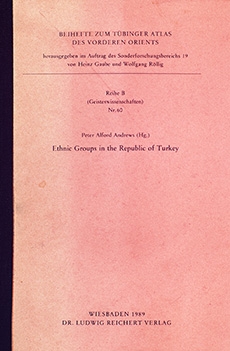|
ACKNOWLEDGEMENTS
A book of this kind could not be compiled without an enormous amount of help. I am deeply grateful to all those who have contributed information to it. Above all, of course, I am indebted to the Turks themselves. Countless individuals in villages all over Turkey, in taxis and in minibuses, in restaurants, cafés and shops, nomad camps, offices, and society drawing rooms, have made their contribution. Equally Turks from all walks of life here in Cologne have given their uninhibited help, often collecting names of villages from friends or relations. It would hardly be right or fair to single out particular people for mention: I thank them all from my heart.
I am equally indebted to academic colleagues who have answered my often-persistent queries with such patience and generosity. I should especially like to thank Dr. H. Anschütz, Pfarrer S. Barbé, Dr. P. Bumke, Dr. R. Cribb, Dr. E.Danielsen, W. Dietrich, Dr. M. Epstein, Arbogast Freiherr von und zu Franckenstein, Dr. A. Gökalp, Pfarrer Y. Harman, Dr. K.-P. Hartmann, Prof. R. H.Hewsen, Dr. U. Hirsch, S.Hissou, Prof. Dr. W.-D. Hütteroth, Prof. Dr. O.Jastrow, Dr. K. Kehl, Prof. D. N. MacKenzie, Dr. P. Mackridge, A. Mango, H.Mehn, B. Morvaridi, Prof. Dr. L. Nestmann, Dr. B. Ozbek, Prof. Dr. U. Planck, J. Powell, Prof. Dr. H.Sohrweide, Dr. I.Svanberg, Dr. F. Thordarson, Prof. Dr. A. Tietze, Dr. B. Wolbert, Dr. M. van Bruinessen, and Dr. L. Yalçin for all they have done to make the map and book a success. I owe a great deal to the initiative, patience and untiring help provided by my assistant, Rüdiger Benninghaus: without him the book could not have assumed its present form in the time available. G. Simbriger M.A., too, did much to help in editing some of the texts. My children have earned special thanks for standing by as an emergency labour force, notably in locating villages.
It is only the continuing support of all those responsible at the Deutsche Forschungsgemeinschaft that has enabled me to complete the project. I thank them, as its sponsors, and the Sprecher, Prof. Dr. W. Röllig, the Coordinator, Prof. Dr. H. Kopp, and the Director of this Institute, Prof. Dr. U. Johansen, for their sustained faith and encouragement.
Finally I should like to thank my colleagues in the TAVO project, Dr. E. Orywal and Dr. K. Hackstein, for their advice during many discussions on the intricacies of ethnicity, and for helping me to avoid at least the more painful mistakes in my German correspondence.
Institut für Völkerkunde,
Universität zu Köln
Peter Alford Andrews
Note on Transcription
Where accepted English spellings for the names of ethnic groups already exist, these have been used, especially if the group concerned is of other than Turkish origin: thus Chechen, Ingush, or Hemshinli are used rather than their equivalent Turkish spellings, though the latter are listed in the catalogue (section B). Similarly English spellings are used for religious denominations, as in Shii or Chaldean.
Otherwise all Turkish words, including the names of ethnic groups, personal names, and place names, have been given in the standard Turkish alphabet and spelling. Exceptions have been made, however, for Istanbul and Izmir, whose pronunciation is so well known to the Western reader that the dot on the initial I seems superfluous. Turkic words are treated similarly.
Non-Turkish names have been given in the usual Tubingen transcription system, where appropriate (see Arbeitsheft Nr. 15). Otherwise they have been taken from standard works such as Geiger et alii. In the case of Kurdish, there may be some inconsistency in the vocalisation, since most of the sources are Turkish, and reflect a Turkicised pronunciation: the names of tribes and places have generally been spelled with the vowels as originally recorded, and the editor asks to be excused for his inability to provide more authoritative transcriptions.
Note on Listings
In the arrangement of the towns and villages listed, the usual Turkish order has been followed, ranked according to province, sub-province, and district (il, ike, bucak, or in the old parlance vilayet, kaza, nahiye). The villages then follow in alphabetical order. Spellings of place names are as given in the Genei Nüfiis Sayimi (census) for 1975, and Köylerimiz 1981. Map 2 in this volume shows these divisions for the period ca. 1962.
Ethnic groups are listed in the catalogue (section B) and the village lists (section D) according to the numeration given on the map, but with the addition of some sub-numeration.
Provincial centres are referred to, particularly in the lists, as cities, and sub-provincial centres as towns, regardless of size, in order to avoid the confusion arising from the dual use of il and ike in Turkish.
…..
|
